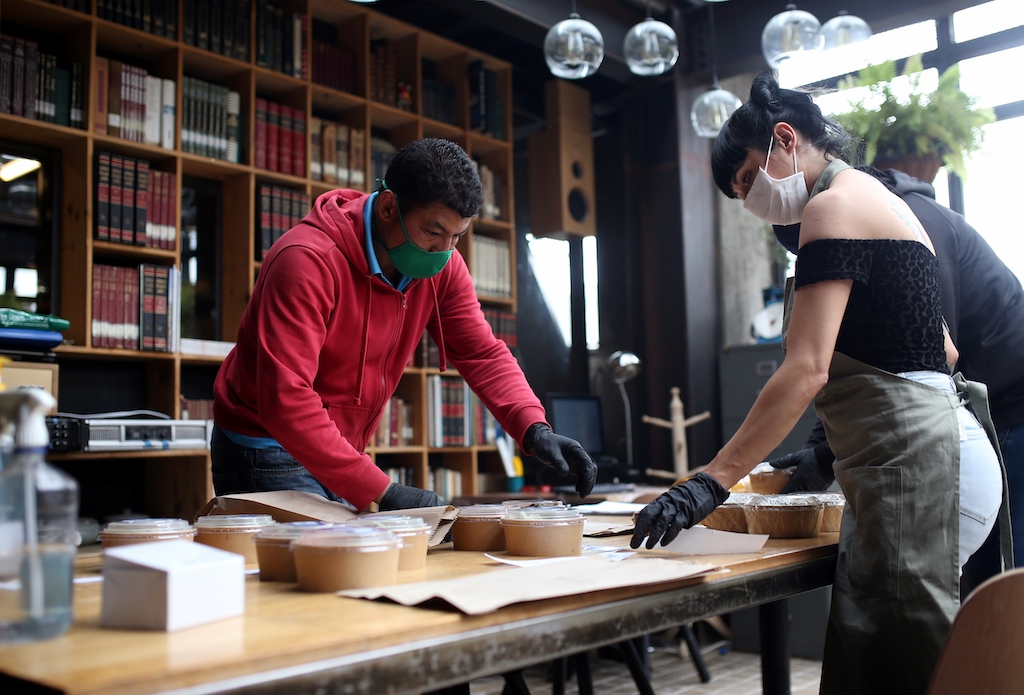As countries face the prospect of “reopening” life after COVID-19, many decisions about the “new normal” must be taken. Everyone recognizes that we can’t simply go back to living exactly as we did before. How should Catholics think about the choices we face?
Above all, we need to develop the virtue of prudence. Prudence is one of the four traditional cardinal (“hinge”) virtues. But it is often neglected or misunderstood.
We often think about being prudent as being careful, and that’s certainly part of it. But like the other virtues, prudence is a mean between two extremes. Acting with prudence avoids recklessness, but also avoids being overly careful, paralyzed by inaction.
Thomas Aquinas defines prudence as “applying right reason to action,” and he particularly emphasizes that prudent action involves seeing clearly. He quotes St. Isidore, for whom the prudent person is “one who sees as it were from afar, for his sight is keen.” The prudent person acts well because she sees more.
Prudence, like all virtues, is acquired by experience, by habitual action. We become better (or worse) over time. For example, many people are experts in their work simply because they have “seen it all.”
Doctors can better diagnose patients; experienced teachers know how to handle classroom problems. A grocery store manager said to me that, after decades in the business, when he walked into a store, the things that were wrong stood out to him like color amid a black and white film. That’s prudence.
Most of us have become experts at “seeing” over the past few months — seeing the distance between people or seeing surfaces we are touching, more alert to possible contagion. But prudence is about “seeing” rightly so that we can act rightly.
Our first COVID-19 experience was about what to avoid doing, but prudence is also a matter of developing new ways to act virtuously under difficult circumstances. As we reopen, we need creative ideas about how to do things differently, ones that go beyond shutting down.
Three points are crucial. First, we will have to make choices about what to do.
Prudence is a necessary virtue because it is impossible for laws and rules to determine every choice we make. Of course, we will continue to have laws governing certain matters — for example, wearing masks in spaces where distancing is not possible or mandating capacity limits for event spaces.
But laws cannot accommodate all the situations we might face. Even determining “capacity limits” is an exercise in prudence.
In particular, we need to do our best to understand how the virus spreads: indoor spaces in which people remain a long time and where people may be talking loudly and coughing are very key, as are events where there is close bodily contact or eating involved.
Making prudent decisions on this basis means that we might think differently about the same room: holding an evening social might not work but holding a lecture might.
Second, in addition to what we do, we need to exercise prudence in making decisions about who to do it with.
We know that the virus is particularly dangerous to those who are older or have underlying conditions. We also know that some people are more prudent than others — that is to say, it would be prudent to be more cautious with someone who is not cautious.
These are both very challenging observations; honestly, we will have to make different choices for interacting with different people.
Here we need the “creative” side of prudence: How might we help the less prudent become more prudent? How might we pay attention to how to rescue vulnerable people from descending into isolation as others are able to go out? (This last question is very relevant for churches.)
Prudential questions of “what” and “who” also require attention to justice. In the Catholic tradition, the virtues are connected. For example, the prudent person is also the person who “sees” considerations of the common good — that is, they see how their own choices affect others.
Third, prudence requires us to recognize that we cannot simply make choices based on our own good, but we must consider the common good, the conditions required for all to flourish.
The reason mask-wearing in indoor spaces with strangers is so important is because the mask prevents you from unknowingly spreading the virus to others. It is not simply a matter of self-protection, but a matter of sharing a space with others. It is a kind of “good manners” that recognizes the space and the air are shared.
Another example from my own life: When my university returns in the fall, I will likely be asked to do things that I myself might argue with but that are vitally important for maintaining a campus-wide commitment to safety. There is nothing like seeing people flouting rules to encourage other people to also flout the rules.
The common good means showing each other in justice that we respect our shared space, behaving in predictable ways that all follow.
Cloutier is associate professor of moral theology at The Catholic University of America.

